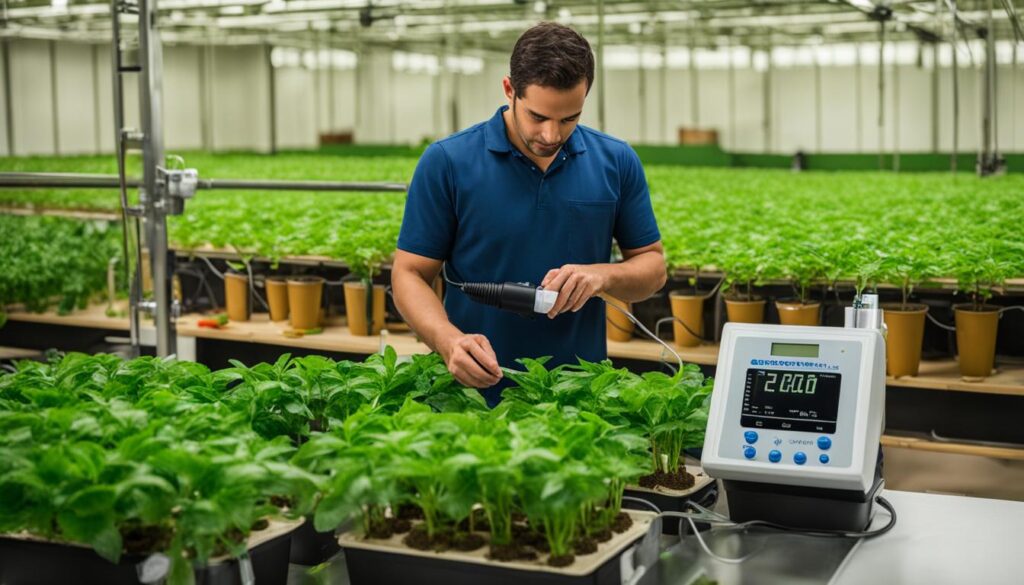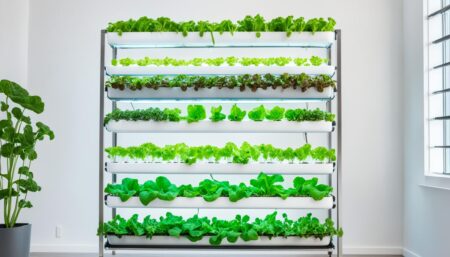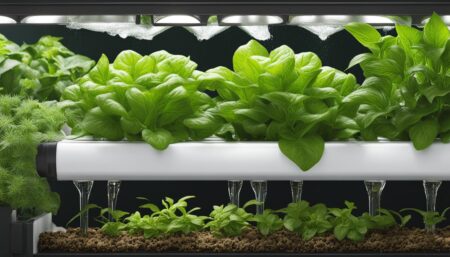Calibrating a pH meter is essential for accurate measurements in hydroponic gardening. pH meters are used to determine the acidity or alkalinity of a solution, and maintaining the correct pH level is crucial for healthy plant growth. It is recommended to use pH calibration solutions specifically designed for pH meters to ensure accurate and consistent readings.
When it comes to hydroponic gardening, precision matters. To achieve optimal plant growth, it’s important to calibrate your pH meter regularly. By doing so, you can ensure that your pH measurements are accurate and reliable. In this article, we’ll discuss why calibrating your hydroponic pH meter is necessary, how to calibrate it step by step, and the different types of calibration solutions available. Let’s dive in and learn more about the importance of precision in hydroponic gardening!
How Can You Calibrate a pH Meter?
Calibrating a pH meter is a simple process that ensures accurate and reliable measurements in hydroponic gardening. By following these step-by-step instructions, you can easily calibrate your pH meter and enhance the success of your plants.
To begin the calibration process, you will need pH calibration solutions, typically pH 4 and pH 7 solutions. Start by placing the pH sensor’s electrode in the pH 7 solution and allow it to stabilize. Once stabilized, rinse the electrode with demineralized water and then place it in the pH 4 solution.
Repeat this process until the correct measurement of pH 4.0 is obtained. By calibrating the pH meter, you ensure that the electrode is functioning properly and providing accurate readings. This is crucial for maintaining the optimal pH level for your plants’ growth and overall health.
Important Note:
Always refer to the manufacturer’s instructions for your specific pH meter model, as the calibration process may vary slightly between different devices. It is also recommended to check the calibration of your pH meter regularly, especially if you are using it frequently or in a highly contaminated environment.
By calibrating your pH meter before each use and following the proper calibration procedures, you can ensure accurate and consistent pH measurements in your hydroponic system. This allows you to monitor and adjust the acidity or alkalinity of your nutrient solution, providing the optimal conditions for your plants to thrive.
Why Do You Need to Calibrate a pH Meter?
Regular calibration of a pH meter is crucial for accurate pH measurements in hydroponic gardening. The pH electrode’s offset and slope can change over time due to factors such as contamination and usage, leading to less precise readings. By calibrating the pH meter, you can determine the actual offset and slope of the electrode and make any necessary adjustments.
Accurate pH measurements are essential in hydroponics to ensure optimal nutrient uptake by plants. The pH level affects the availability of nutrients in the nutrient solution, and any deviations from the desired pH range can result in nutrient deficiencies or toxicities. Without proper calibration, you may misjudge the pH level and unintentionally provide suboptimal conditions for your plants.
In addition to benefiting plant health, calibrating a pH meter is also important for those using a pH controller in their hydroponic system. A pH controller automatically adjusts the pH of the nutrient solution based on the desired setpoint. Regular calibration ensures that the pH controller maintains accuracy and effectively controls the pH level in your hydroponic setup.
By calibrating your pH meter and pH controller regularly, you can ensure accurate pH measurements, provide the ideal pH conditions for your plants, and optimize the overall success of your hydroponic garden.
Why Is Calibration Necessary?
Calibration is necessary because the pH electrode’s performance can change over time, affecting the accuracy of pH measurements. The electrode may become contaminated or experience electrode drift, resulting in readings that deviate from the true pH value.
Without calibration, you may be working with a pH meter that isn’t giving you accurate results. This can lead to imbalances in your nutrient solution, hindering plant growth and potentially causing nutrient deficiencies or toxicities.
Calibrating your pH meter helps you establish a baseline for accurate measurements by calibrating it to known standard solutions with a specific pH value. This process ensures that your pH meter is properly calibrated and ready to provide reliable data for your hydroponic gardening needs.
Benefits of Regular Calibration
Regular calibration of your pH meter offers several benefits:
- Ensures accurate pH measurements for precise control of nutrient solution pH
- Prevents nutrient deficiencies or toxicities caused by pH imbalances
- Optimizes nutrient uptake for healthier plant growth
- Helps maintain the effectiveness of a pH controller in automated hydroponic systems
- Increases the overall success and productivity of your hydroponic garden
By making calibration a routine part of your hydroponic gardening practice, you can stay on top of pH variations, provide optimal growing conditions for your plants, and achieve the best possible results.
| Common Signs That Your pH Meter Needs Calibration | Recommended Calibration Frequency |
|---|---|
| Unexpected and inconsistent pH readings | At least once a month |
| pH readings that do not match expected values | After cleaning the electrode or using a new one |
| Changes in plant growth or abnormalities | After a prolonged period of inactivity |
| Using strong solutions or needing precise measurements | As needed or indicated |
Solutions to Calibrate a pH Meter
When it comes to calibrating your hydroponic pH meter, choosing the right calibration solutions is crucial. There are several types available, each with its own level of accuracy and pH range. Here are the three main types:
Standard Calibration Solutions
Standard calibration solutions are widely used and provide a guaranteed accuracy of plus or minus 0.01 on the pH scale. They come in a range of pH values, allowing you to calibrate your meter to the specific pH range you need. These solutions are suitable for most hydroponic applications and offer reliable results.
Millesimal Solutions
If you require even greater precision, millesimal solutions are the way to go. These solutions offer an accuracy of plus or minus 0.002 on the pH scale, providing highly accurate readings. Millesimal solutions are ideal for advanced hydroponic setups and scientific research where precise pH measurements are essential.
Technical Solutions
Technical solutions offer a wider range of pH values to meet more specific measurement needs. They are designed for specialized applications where standard or millesimal solutions may not be suitable. Technical solutions provide flexibility in calibrating your pH meter to different pH ranges, ensuring accurate measurements in unique hydroponic setups.
To determine the best calibration solution for your needs, consider the level of accuracy required and the specific pH range you will be measuring. Using high-quality calibration solutions will ensure accurate and consistent pH readings, giving your plants the optimal conditions for growth.
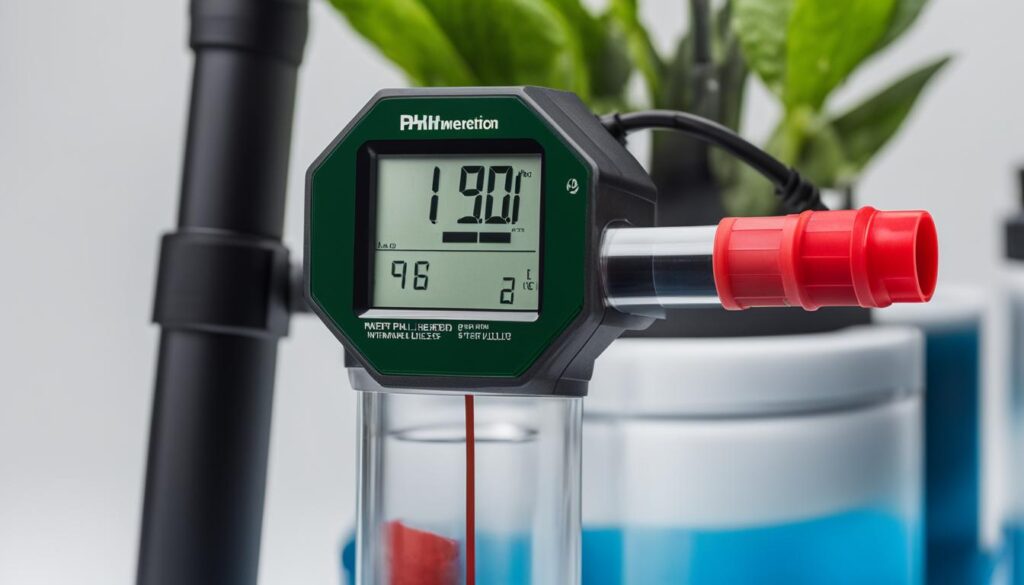
How Often Should You Calibrate Your pH Meter?
Regular calibration of your pH meter is essential to ensure accurate and reliable readings in your hydroponic gardening setup. The frequency of calibration depends on various factors such as usage, contamination, and the specific requirements of your plants. Here are some general guidelines to help you determine how often you should calibrate your pH meter:
- Monthly Calibration: It is recommended to calibrate your pH meter at least once a month to account for any changes in electrode performance over time. This is especially important if you use your pH meter frequently or if it becomes highly contaminated. Regular calibration ensures that your pH meter is providing accurate measurements and helps you maintain optimal nutrient uptake by your plants.
- New Electrode or Cleaning: Whenever you use a new electrode or clean the existing one, it is advisable to calibrate your pH meter. This ensures that the electrode is functioning correctly and provides accurate readings. Cleaning the electrode removes any buildup or residue that may affect its performance.
- Prolonged Inactivity: If your pH meter has been unused for an extended period, it is recommended to calibrate it before using it again. This helps ensure that the electrode is still in good condition and provides accurate measurements.
- Precise Measurements or Strong Solutions: Certain situations may require more frequent calibration. If you need precise measurements or are working with strong solutions, it is advisable to calibrate your pH meter before each use. This ensures that your measurements are accurate and reliable.
Remember, accurate pH measurements are crucial for the health and growth of your plants in hydroponic gardening. By calibrating your pH meter regularly and following the manufacturer’s instructions, you can ensure optimal performance and maximize the success of your hydroponic system.
| Factors | Recommended Calibration Frequency |
|---|---|
| Monthly Calibration | At least once a month |
| New Electrode or Cleaning | Before use |
| Prolonged Inactivity | Before use |
| Precise Measurements or Strong Solutions | Before each use |
Final Thoughts of pH Calibration Solutions
pH calibration solutions play a crucial role in ensuring the accuracy and reliability of pH measurements in hydroponic gardening. By using professional-grade calibration solutions, you can achieve stability and consistency in your pH readings, leading to better control of nutrient uptake by plants. Before each use, it is recommended to calibrate your pH meter using at least two calibration solutions to obtain the most precise and accurate results.
Calibrating a pH meter may initially seem time-consuming, but with practice, it becomes a routine and essential step in maintaining optimal pH levels in your hydroponic system. It is important to follow the manufacturer’s instructions for calibration carefully and to handle the pH meter with care, including regular cleaning and proper storage.
When choosing calibration solutions, you have several options to consider. Standard calibration solutions provide guaranteed accuracy on the pH scale and are available in a range of pH values. Millesimal solutions offer even greater precision, ideal for more demanding measurements. Technical solutions provide a wider range of pH values to cater to specific needs. The choice of calibration solution depends on the desired level of accuracy and the pH range you need to measure.
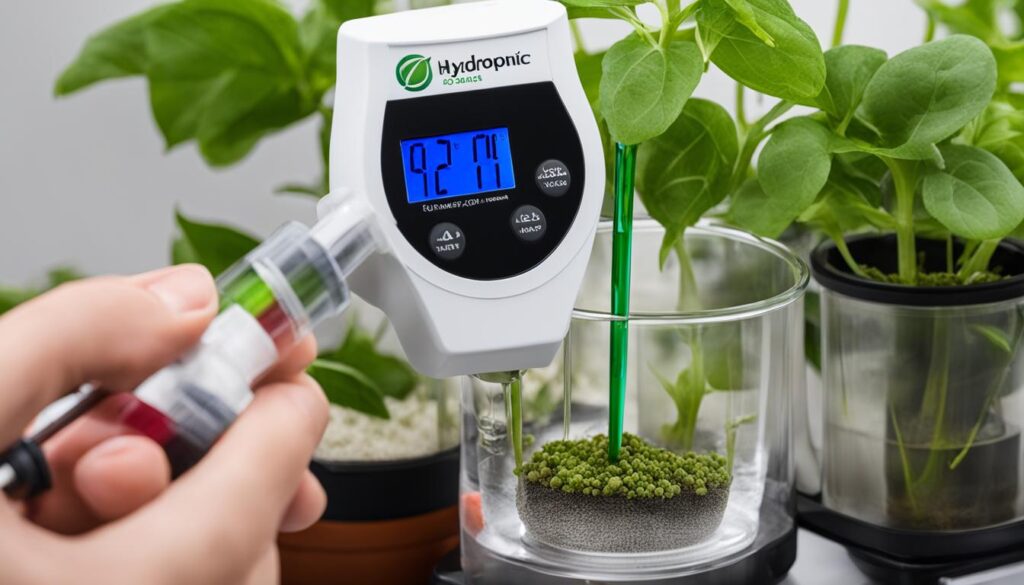
Benefits of pH Calibration Solutions
“Using professional-grade pH calibration solutions ensures stability and consistency in results.” – pH Expert
Regular calibration of your pH meter is vital to account for changes in electrode performance over time. It helps to identify any offset or slope variations and make necessary adjustments for accurate measurements. By investing in a high-quality pH meter and employing proper calibration techniques, you can optimize the growth and health of your plants in hydroponic systems.
Remember, accurate pH measurements are paramount in hydroponic gardening, as they directly impact plant nutrient availability. With pH calibration solutions and proper calibration practices, you can confidently nurture your plants and create an optimal growing environment.
Conclusion
Calibrating your hydroponic pH meter is essential for maintaining the optimal pH level in your nutrient solution. By following this step-by-step calibration tutorial and using the right calibration solutions, you can ensure accurate and consistent pH measurements for your hydroponic garden.
Regular calibration is necessary to account for changes in the pH meter’s electrode performance over time. Investing in a high-quality pH meter and taking proper care of it, including regular cleaning and storage, will ensure reliable and long-lasting performance.
By calibrating your pH meter at least once a month or as needed, you can avoid nutrient deficiencies or toxicities in your plants. Accurate pH measurements are crucial for optimal nutrient uptake and healthy plant growth.



